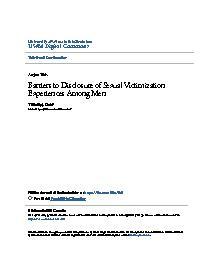Barriers to Disclosure of Sexual Victimization Experiences Among Men
Efforts to better understand sexual victimization experiences among male populations have been chiefly absent (Spataro, Moss, & Wells, 2001; Stermac, Sheridan, Davidson, & Dunn, 1996). ). Research indicates that approximately 1 in 71 men in the United States (i.e., 1.6 million men) have been raped in their lifetime, and nearly 1 in 5 men (i.e., 25 million men) have experienced sexual victimization other than rape in their lifetime (Black, Basile, Breiding, Smith, Walters, Merrick, Chen, & Stevens, 2011). It is suggested these estimates do not fully portray the actual prevalence given hesitancy of male victims to report the crime (Bullock & Beckson, 2011; Tjaden & Thoennes, 2006). Despite the elevated occurrence and deleterious impact of sexual violence, it remains one of the most underreported crimes in the U.S., particularly among male populations (Finkelhor, Hotaling, Lewis, & Smith, 1990; Sable, Danis, Mauzy, & Gallagher, 2006). Studies demonstrate disclosure of these experiences to be associated with mental and physical health gains as well as legal and political benefits (Ahrens, Campbell, Ternier‐Thames, Wasco, & Sefl, 2007; Uchino, 2004). The current study descriptively details the rates, demographic characteristics, emotional impact, as well as disclosure rates and details of sexual victimization experiences among men. The study also quantitatively examines whether sexual victimization details, emotion regulation strategies, male rape myth acceptance, conformity to masculine norms, attitudes toward gay men, attitudes toward women, stigma levels, and symptoms of PTSD significantly relate to disclosure behaviors of men experiencing sexual victimization.
Geachte bezoeker,
De informatie die u nu opvraagt, kan door psychotraumanet niet aan u worden getoond. Dit kan verschillende redenen hebben,
waarvan (bescherming van het) auteursrecht de meeste voorkomende is. Wanneer het mogelijk is om u door te verwijzen naar de bron
van deze informatie, dan ziet u hier onder een link naar die plek.
Als er geen link staat, kunt u contact opnemen met de bibliotheek,
die u verder op weg kan helpen.
Met vriendelijke groet,
Het psychotraumanet-team.
151 pagina's | Milwaukee, Wisconsin: University of Wisconsin – Milwaukee
https://dc.uwm.edu/etd/1620/


